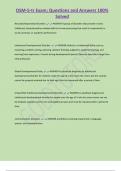DSM -5-tr Exam ; Questions and Answers 100% Solved Neurodevelopmental Disorders ANSWER -A group of disorders that present in early childhood; characterized by marked deficits in brain processing that result in impairments in social, personal, or academic performance Intellectual Developmental Disorder ANSWER -Defecits in intellectual ability such as, reasoning, problem solving, planning, abstract thinking, judgment, academic learning, and learning from experience. Present during developmental period. (Severity Specefiers range from mild -profound). Global Developmental Delay ANSWER -A substitute diagnosis for intellectual developmental disorder for children under the age of 5 who meet the critera but the severity cannot be properly analized due to their age. Must be reassesed after a period of time. Unspecified Intellectual Developmental Disorder ANSWER -A substitute diagnosis for intellectual developmental disorder for people over the age of 5 who for some reason can not be properly assesed. Used in rare and exeptional cases and must be reassesed after a period of time. Communication Disorders ANSWER -Conditions involving impairment in language, speech, and communication. DSM -5-tr Exam ; Questions and Answers 100% Solved Language Disorder ANSWER -Persistant difficulties with the aquisition and use of language (of all forms) including: Reduced vocabulary, limited sentence structure, and impairments in discorse. Speech Sound Disorder ANSWER -Persistant difficulty in articulating phonemes that causes interference with social participation, academic achievment, or occupational performance. Childhood -Onset Fluency Disorder (stuttering) ANSWER -Difficulty in communication characterized by: Sound or syllable repitition, sound prolongations of consonants as well as vowels, broken words, audible or silent blocking, circumlocations, words pronounced with an excess of physical tensions, monosyl labic whole -word repetitions. Additionally the defecits cause anxiety. Social (Pragmatic) Communication Disorder ANSWER -Persistent difficulties in the social use of verbal and nonverbal communication characterized by: Failure to use greetings or other social language appropriate to the context, failure to meet social contexts, difficulty following rules of communicati on, difficulty understanding what is not implicently stated. Unspecified Communication Disorder ANSWER -A communication disorder that cause marked impairment but there is not enough information to make a more complete diagnosis. DSM -5-tr Exam ; Questions and Answers 100% Solved Autism Spectrum Disorder ANSWER -Persistant defecits in social communication and interaction across multiple contexts, deficits in nonverbal communication behaviors used for social interaction. Restrictive patterns of behavior, interests, or activities. Hyper or hyopreactivity to s ensory imput. Present from a young age. (Specifiers range from "requiring support" to "Requiring very substantial support." Attention Deffecit / Hyperactivity Disorder ANSWER -A persistant pattern of inattention, hyperactivity, and/or impulsivity. Symptoms must have been present prior to the age of 12 though diagnosis can happen at any time. Specefiers for inattentive type, hyperactive type, or combined type. Other Specified Attention Deffecit / Hyperactivity Disorder ANSWER -Used for cases where the individual has distress or impairment due to inattention and/or hyperactivity but does not meet the full criteria for ADHD. Unspecified Attention -Deficit/Hyperactivity Disorder ANSWER -Used for cases where the individual has distress or impairment due to inattention and/or hyperactivity but there is not enough information to make a more complete diagnosis Specific Learning Disorder ANSWER -A disorder characterized by persistent difficulties implementing academic skills despite interventions. Can be with impairment in reading, impairment in written expression, and/or impairment in mathematics. DSM -5-tr Exam ; Questions and Answers 100% Solved Motor Disorders ANSWER -A group of disorders characterized by motor symptoms such as tics, stereotypic movements, or dyscoordination Developmental Coordination Disorder ANSWER -Aquesition and execution of moder skills is substantially lower than typical of the chronological age. These difficulties manifest as clumsiness, slowness, and/or inaccuracy of performance of motor skills. Steryotypic Movement Disorder ANSWER -Repetitive, seemingly driven, and apparently purposeless motor bhavior (hand waving, body rocking, head banging, self biting, hitting own body, etc) that results in marked impairment or causes self -injury. Tic Disorders ANSWER -A group of disorders that involve involuntary physical behaviors that can be motor or vocal. Tourette's Disorder ANSWER -Sudden, rapid, recurrent, nonrhythmic motor movements or vocalizations that are present before the age of 18 and wax/wane over the course of at least 1 year. Persistent (Chronic) Motor or Vocal Tic Disorder ANSWER -Single or multiple motor or vocal tics have been present during the illness, but not both motor and vocal.




